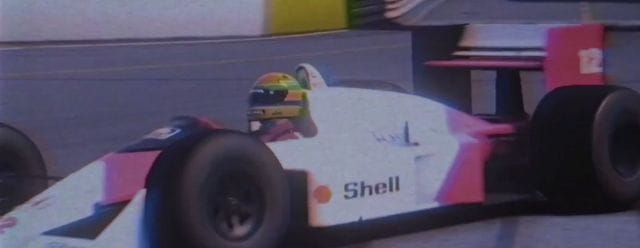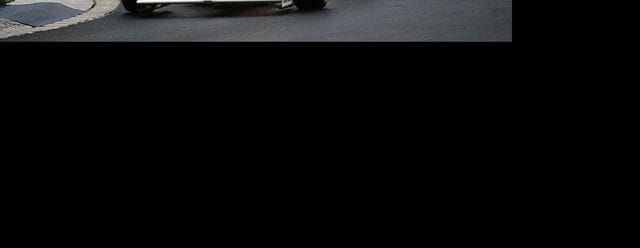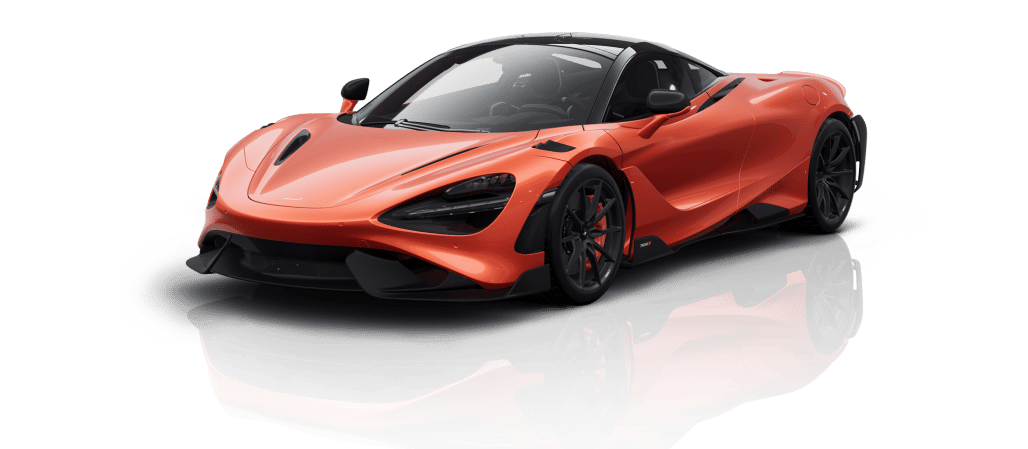
Papaya Mirror: McLAREN’s Greatest What Ifs
Following the release of Black Mirror S6, we explore some alternate F1 universes
Picture this, you’re at our factory, wondering between the stacked trophy cabinets, past Alain Prost’s four Championship-winning trophies for McLaren and onto the Boulevard, where you catch a glance of Michael Schumacher’s MP4/14, fitted with the now universal brake fiddle. You’re greeted by Mika Häkkinen, who retells the story of how he returned to McLaren in 2003 to win his third title…
The release of Black Mirror Season Six failed to include any alternate Formula 1 timelines, so we’ve had a go at scripting some ourselves, based (very loosely) on real events.
They’re not quite the technology-gone-wild-style universes of Black Mirror, but they are thought-provoking. How would F1’s history look if Damon Hill had joined McLaren alongside Mika Häkkinen or if Emerson Fittipaldi had stayed at McLaren beyond 1975?
Whether you consider them to be dystopian or utopian is up to you. Let us know in the comments on social media which alternate realities intrigue you the most and what other timelines you would be interested in seeing us explore.
Episode I: It never rains, but it pours
What if it didn’t rain in the 1984 Monaco Grand Prix?
Alain Prost was only 12 and a half points away from being Formula 1’s only eight-time World Champion – and less than 30 away from being a 10-time title-winner.
Prost had five title-winning teammates during a 13-year career and beat all of them, retiring with 51 wins, 206 podiums and four F1 titles. How much higher would those numbers have been if it had never rained in Monaco in 1984?
Unaware of its implications on his title bid that year, Prost stood elated on the top step of the podium in Monte Carlo for the first time in his and McLaren’s history.
Only half-points were awarded after a rain-hampered race in the principality was cut short due to the dangerous conditions, and at the end of the season, Prost missed out on the title to Niki Lauda by half a point, a record that still stands today.
Ayrton Senna was chasing down Prost in Monaco and may have overtaken the McLaren, but Prost would have still gained more points in this scenario. If the race had gone the distance and Prost had finished second, he’d have taken home six points instead of the four-and-a-half he actually received. Meaning that there’s a strong possibility that he’d have gone on to win the title.
Would the confidence and the momentum he gained have impacted the rest of his career? It seems unlikely that it would have influenced his fourth-place finish in 1987 all that much, but there’s a slight chance that it could have shaped the 1988 campaign, where he missed out on the title to Senna by three points.

Episode II: F1 Family Feud
What if Michael Schumacher had joined McLaren?
The world finally got the chance to see a Schumacher at the wheel of a McLaren earlier this year when it was announced that we would be able to call upon Mick Schumacher as a reserve driver as part of our arrangement with Mercedes. But 30 years ago, his seven-time F1 championship-winning father, Michael Schumacher, came close to joining us.
Before his move to Benetton, the German had been brought into Formula 1 by Mercedes, so an eventual switch to a Mercedes-powered McLaren team made sense, and talks took place on more than one occasion.
Initially, in 1993, when it was leaked to Schumacher (by McLaren) that his teammate Riccardo Patrese (who we also entertained signing) was on a higher salary. And then again at the end of 1995, when he eventually signed for Ferrari. There’s even footage online of the then McLaren boss Ron Dennis attempting to lure him here.
Had it come to pass, Schumacher and Mika Häkkinen’s legendary rivalry would have likely become one of the sport’s greatest-ever intra-team rivalries.
The pair dominated Formula 1 between 1998 and 2004, and it seems conceivable that instead of the title being shared between McLaren and Ferrari in those years, the pairing would have won more, if not all, of those seven championships for McLaren, exchanging the crown back and forth.

Episode III: Not over the Hill
What if Damon Hill had joined McLaren?
According to his autobiography, Damon Hill reportedly turned down McLaren in 1997 and in 1998, having only been offered a results-based deal, which didn’t include a base salary but would have seen him earn one million dollars per victory.
Given the dominance of our car during that period, and Hill’s ability, you suspect he’d have earned himself a pretty penny. The one-time world champion instead opted for drives with Arrow and Jordan, where he finished 12th and sixth, respectively, with only one win.
Had he joined McLaren, Hill would have been behind the wheel of a much stronger car for 1998, in direct competition with Mika Häkkinen. His previous performances in F1 suggest he’d have been a strong match for the Finn, but we’ll never know whether he’d have been able to beat him to the title in either 1998 or 1999. And what of Michael Schumacher in this particular timeline?

Episode IV: Two brakes are better than one
What if the fiddle brake wasn’t banned?
And we’d have gotten away with it if it wasn’t for you pesky photographers…
Our 1997 challenger, the MP4/12, secretly introduced a now infamous second brake pedal, known internally as the “brake-steer” and externally as the “fiddle-brake.” The canny creation allowed our drivers to choose between using all four brakes or only the rear ones, which made taking corners significantly easier and faster.
It was spotted by an eagle-eyed photographer in the summer of 1997. Although it was completely legal, the brake-steer was later banned - following pressure from other teams - early in 1998, after Mika Häkkinen and David Coulthard finished first and second in the opening two rounds.
Mika went on to take the title anyway, with nine wins from 16 races, but what if he’d been allowed to run the brakes all season? That number could have been much higher, and there may have been a knock-on effect for future seasons.
Supposedly, the brakes were worth nearly half a second per lap, with rivals claiming they were too expensive to copy, so it seems plausible that we’d have been the only team to run them until at least 1999.
And whilst other teams were scrambling to develop their own versions, what could we have achieved in the meantime? Maybe our pace advantage would have stretched into the 2000 title race, which turned out to be the first of four successive titles for Ferrari’s Michael Schumacher.

Episode V: Correr
What if Emerson Fittipaldi hadn’t left McLaren?
Emmo exploded onto the Formula 1 scene in the ’70s, winning within four races of his debut at only 23 years old, before becoming Formula 1’s youngest World Champion at just 25 years old, with McLaren.
The enigmatic Brazilian was our first World Champion and has gone down as one of the most significant drivers in our 60-year history, but it has always felt as if he left us a little too soon. So, what if he hadn’t?
Fittipaldi departed to join his brother’s F1 team, Copersucar Fittipaldi, in 1976 after five wins and 13 podiums with McLaren. The last of those victories, in the 1975 British Grand Prix, would end up being his last in F1.
While we won our second World Championship with James Hunt at the wheel in 1976, Fittipaldi never hit the same heights with his brother’s team. Had Emmo remained at McLaren, then Hunt might never have joined, making it highly likely that Emmo would have beaten Niki Lauda to the Championship in 1976.
In this timeline, Lauda’s return to F1 with McLaren in 1982 still happens, but we never get to see the mercurial James Hunt in McLaren colours, and what a tragedy that would have been.
And maybe, the film Rush would have been called Correr instead…

Bonus Episode: Be right back
What if Häkkinen‘s sabbatical didn’t turn into retirement?
The opening episode of Black Mirror’s second season was called “Be Right Back.” This would have made a fitting title for our Mika Häkkinen storyline, in which the Finn’s sabbatical was precisely that.
In 2001, a mentally drained Mika announced he would take a break from Formula 1. It was never meant to be permanent, but as it turned out, Mika’s fourth-placed finish in the 2001 Japanese Grand Prix would be his last race in the sport.
Had he come back, there’s a chance we’d have been referring to the Finn as a four-time Formula 1 World Champion. An inexperienced Kimi Räikkönen missed out on the title for McLaren in 2003 by just two points to Michael Schumacher.
It isn’t outside the realms of possibility that Mika’s greater experience, both in F1 and at battling Schumacher, could have been enough to get the MP4-17D over the line.
Räikkönen missed out again in 2005 by a slightly larger margin, finishing second to Renault’s Fernando Alonso by 21 points. Still, the MP4-20 was ultra-fast – it’s regularly referred to as one of the greatest F1 cars not to win a title - and there remains a chance that even at 37 years old, Mika’s experience could have helped him extract the additional pace to have taken the championship.




What was James Hunt really like away from the track?
There was more to motorsport's brilliant bad boy than meets the eye
The greatest lap you've never seen
Reimagining Ayrton Senna’s epic qualifying lap at Monaco in 1988
Legendary Laps: Donington 1993
On the anniversary of Senna’s epic win, we celebrate one of F1's Legendary Laps
McLAREN’s famous F1 firsts
We look back at some memorable McLaren firsts


